Homesteading: A Steady-State Counterculture
by Muhammed Al-Refai
A counterculture with a focus on self-sustenance, self-reliance, and lifestyles in harmony with the land and local communities has been steadily brewing. This counterculture is best embodied by modern homesteading, which encompasses a wide range of alternative lifestyles marked by principles such as growing your own food, being a good steward of the land, and keeping strong ties with your local community to help each other build a better life for generations to come.
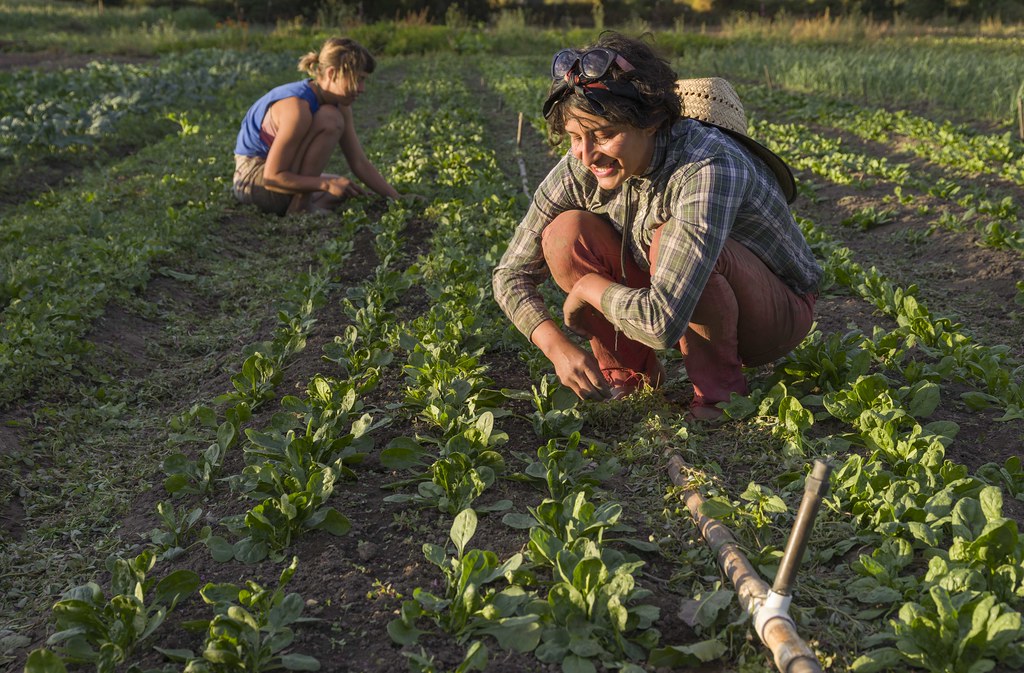
The culture of homesteading helps to facilitate connections with the community. (CC BY 2.0 Bob Dass)
The homesteading counterculture has expanded due to even bigger paradigm-shifting events: the COVID pandemic, disruptions in supply chains, the beat of war drums, and murmurs of recessions and food shortages. But this way of life has been here since the founding of the USA, as it was embodied in the lifestyle of homesteading pioneers.
Homesteading versus the Status Quo
Justin Rhodes is one of many people who walk the talk of the homesteading lifestyle, and he teaches others how to homestead with his family-friendly YouTube channel. He shows over two million monthly viewers how he and his family grow their own vegetables, raise their own meat, and live intimately with their land. Justin is an advocate of permaculture, a sustainable approach to land management that focuses on nourishing the environment using the processes of natural ecosystems. The focus is on working with the land instead of fighting against it, as is common in conventional agricultural practices.
To the agricultural conglomerates of the world, this is a dangerous movement on multiple fronts. Justin and other leaders like him are enlightening us to an alternative method of farming, a method that goes against everything the industry lobbyists have worked for. Genetically modified and patented seeds, pesticide-soaked plants, and nutrient-depleted soils may be the status quo, but are bad choices nonetheless.
What’s America’s largest crop today? Grass! There are 40 million acres of lawn in the continental USA. What would happen if ten percent of Americans stopped watering and manicuring their lawns and instead used their land for growing food or raising animals for their families and community?
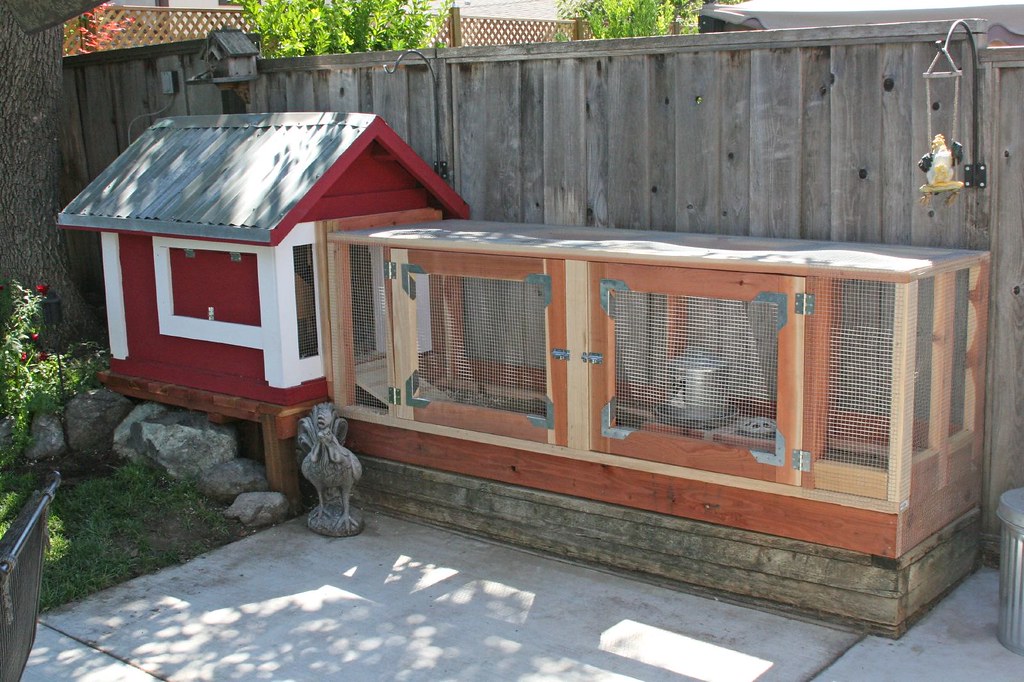
Neighbors in a homestead community can share excess crops, produce, meat, and eggs (CC BY-ND 2.0 Allan Hack).
Plenty of gardeners produce more zucchini than they know what to do with, and backyard chicken owners often produce more eggs than they can eat. Imagine if three million more Americans started keeping chickens in their backyard. How would factory farmers fare with millions of eggs being freely (or cheaply) given from one neighbor to another?
A New Culture
Growing your own food is only one part of this new movement. To assume this steady-state lifestyle, new values and priorities must be set. This means adopting a whole new cultural outlook of distancing oneself from senseless spending and the dysfunctional reliance on one-tap technological solutions.
Homesteading is a multi-generational marathon, not a sprint. It’s disciplined, thoughtful action that favors the long-term health of the land, the community, and the environment to create a sustainable lifestyle that can be passed on from one generation to the next. Following are the key values and intentions of homesteaders:
Produce it yourself — Many people are first drawn to homesteading for food security and to gain access to quality meat, dairy, and produce.
Homesteading is a challenging but rewarding lesson in steady-state economics. Producing what you consume on your own property provides a unique opportunity to learn some important economic truths. The trophic base, the limiter of all limiters, is the land. The amount of productive land will ultimately dictate the population of animals raised and how much crop can feasibly be grown.
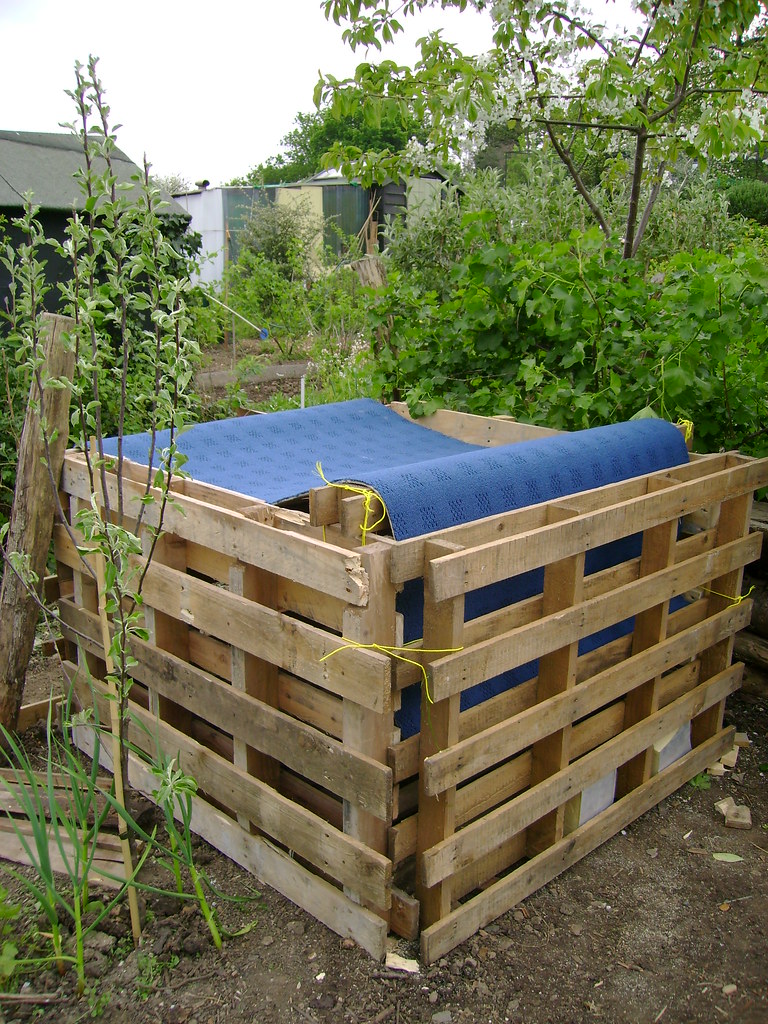
Homesteading involves working with nature, such as turning scraps into compost for plants. (CC BY-NC-SA 2.0 London Permaculture)
Homesteaders also learn to turn their household waste into fruitful production. Food scraps? Turn it into compost. Withering plants? Chicken food. Toilet paper rolls? Seed starters. Why discard what can nourish your plants and animals?
Work with nature — Homesteaders don’t necessarily need large acreages. They learn to be stewards of the land even when working with under an acre or a backyard patch in the suburbs.
For too long, “out of sight” has meant out of mind. Unless you’re driving past the stench from the Tyson’s factory, you don’t think much about where your food comes from. If you’re living on a homestead, putrid smells and toxic chemicals are a front-of-mind problem for you and your progeny.
Sustainability, then, is a generational mindset. You won’t be able to raise multiple generations of crops and animals, and pass down the homestead to your children, if you’re not thinking sustainably.
You want whatever you do to your land to be sustainable. The concept of sustainability has homesteaders turning to natural methods like “do-nothing” farming, permaculture, and rotation of animals and crops in order to ensure optimal health of the land.
Focus on local communities — Communities are essential to a homesteader’s lifestyle. Taking on a homestead is demanding. Animals must be fed, cows must be milked, and plants must be watered. Who’s going to milk your cows when you’re visiting a family member in another state? How will you keep your animals and plants alive when an emergency presents itself?
It’s not so bad being a neighbor to a homesteading family though. They might be producing a dozen extra eggs weekly. Maybe they’ve made too much zucchini bread and canned excess tomato sauce from an exceptionally good harvest. How much more intimate is a gift when it comes directly from your land and becomes a nourishing meal to your neighbor?
Homesteaders can’t do it all on their own. Someone down the road might have a backhoe needed for a small pond. Another might be a welder who can help with a goat stanchion. Another might produce spare compost. A mother might be a brilliant teacher, a father might be a great coach, and yet another person might have an extra outbuilding that can be used as a schoolhouse.
Communities decrease the length of supply chains and increase resilience. National or international supply shocks are less…shocking.
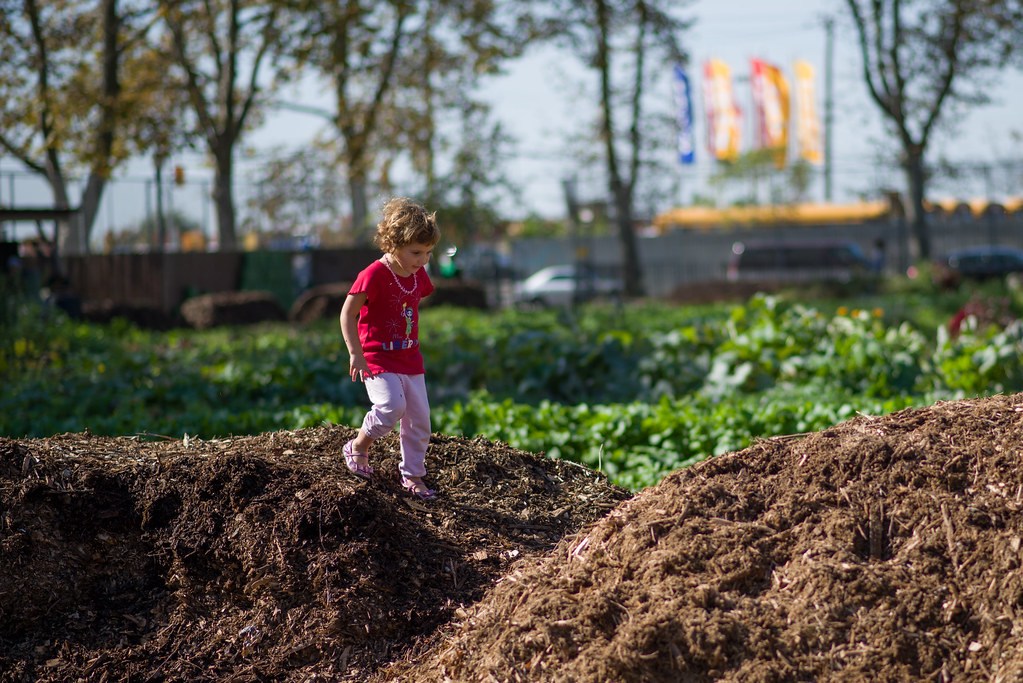
Children of homesteaders can learn practical skills and connect with their environment. (CC BY-NC-SA 2.0 Ezra Barnett Gildesgame)
Homeschool — Many homestead communities also tend to favor homeschooling, perhaps because of dissatisfaction with the public school system or needing people at home to tend to the property. This means either teaching your kids yourself or banding with local homeschoolers to educate children.
Invariably, homeschooling means that some parents will opt to drop out of the workforce when pursuing a homestead. For the steady stater, this should be celebrated. A decrease in the workforce will lessen GDP and its ecological footprint. With only one parent garnering a traditional income, consumption and waste decrease as well, while home-grown sustenance increases. In a homeschooled, homesteading society, luxury demand would plummet.
Homeschooling is also a major win for the children who get to spend more time outside in the sun, exploring and learning in nature, getting hands-on practical skills, connecting with their environment, and spending more time with their families. Children will, much like their parents, have a deeper understanding of the resources it takes to run their households, communities, towns, counties, states, and country by being highly connected to the building blocks that underline it all, starting with soil and water.
The counterculture of steady-state homesteading proves to be beneficial on many fronts: for children who get to experience homeschooling and the importance of the land and community; for parents who get to develop and enjoy rich social networks beyond Zoom calls and office buildings; and for the environment itself, keeping it productive for the next seven generations and more.
Muhammed Al-Refai is a journalism intern at CASSE.

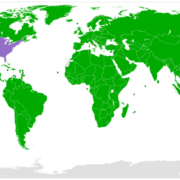
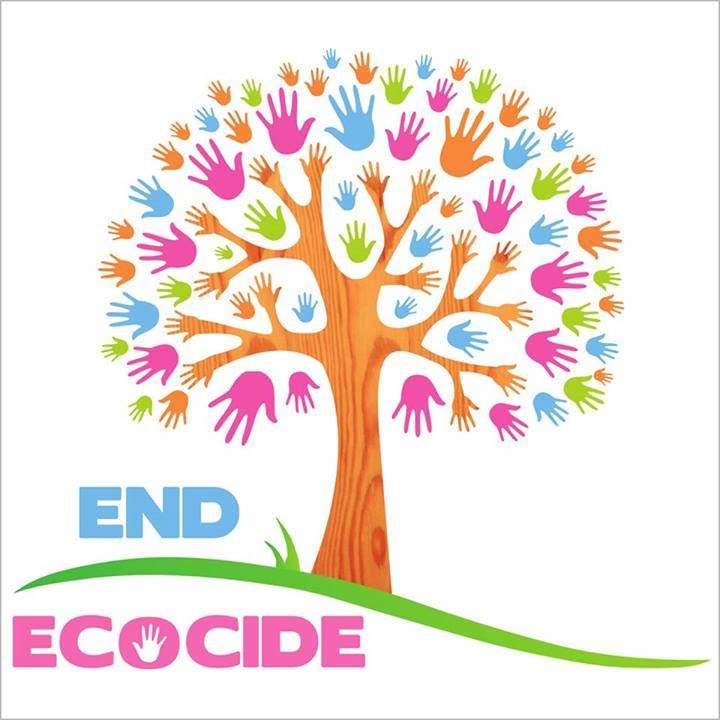


All fine and dandy but the elephant in the room is climate . Take a read on the
stress the Colorado river system is experiencing. No water, severe drought…..
it does not matter how you change your life style now. Just how do you figure
on practising a homesteader type of life style withe the deterioration of climate.
A little late in the game I am afraid.
“…does not matter how you change your lifestyle now”? Sorry but that’s defeatist nonsense. Yes, global heating is upon us. Nevertheless, people will be making a living, one way or another, as long as Homo sapiens remains extant. Our guest contributor has described a more sustainable (and frankly happier, for a lot of us) way of going about it than the industrial, pro-growth way that brought us global heating, biodiversity loss, and all the other hazards of ecological overshoot.
Hi Tim,
I understand your sentiment, but I have to disagree whole heartedly. Building a food system that’s resilient to climate change depends on individuals taking business away from the current industrialized system (which is contributing to the stress on the water system). Through homesteading, community mutual aid, and curated knowledge networks, it is possible to build a climate resilient food system. Homesteading is going to be a necessary piece of the puzzle going forward.
RE: “But this way of life has been here since the founding of the USA, as it was embodied in the lifestyle of homesteading pioneers.” No, no, no. How can you dismiss the indigenous peoples who lived in what is now called the Americas (named after an obscure Spaniard) for many thousands of years and who practiced very effective food and raw material agriculture.
Hi Robert,
Your point is well taken, and I don’t think Muhammed meant to erase indigenous history. Many Native American nations evolved communal food systems that played a vital role in informing colonists on how to live with in a novel ecosystem. Manifest destiny did involve a considerable amount of homesteading however, and I think modern homesteaders can learn from both systems.
Also, Amerigo Vespucci was Italian, not Spanish.
Thank you Muhammed. Superb article. I did some homesteading in the 1980s, fed 20 hens and 2 pigs with leftovers from restaurants. I’m a believer but it needs to be practiced by massive numbers of people, preferable convincing folks in suburbs to convert their wasted lawns (imaginary prairies) into productive gardens. An infrastructure exists for this in places like Detroit, Orlando and some Canadian cities. You also have the Transition Towns movement that does such things in entire communities. It is not too late. However, when industrial agriculture implodes and food becomes scarce, what do you do with a scenario whereby marauders will be attacking the transition communities?
Tim, it’s honestly time to choose what kind of people we all want to be – nihilistic and fingerpointing, or optimistic and collaborative, or somewhere in between. Frankly although the challenges of the perfect storm western civilization has created are enormous, relocalization and regenerative agriculture are precisely the sorts of things we need to reduce impact, improve local and household food and water security, and get our mindsets and learned skills in shape again for the times ahead. Both as a scientists and policy strategist, and as a Transition Towns board member, I really liked this article and hope to see more from Muhammed Al-Refai on other aspects of degrowth and reconnection. Thanks CASSE & co.
While I’m generally sympathetic to the concept of homesteading, the crucial issue of ownership of and access to land is not addressed. Mentioned is: “You want whatever you do to your land to be sustainable.” but many people don’t ‘have’ land. Land rights and land reform is an important issue for many people in the world today – I would guess it would run into the hundreds of millions, if not billions (someone please correct me on this if necessary). As such, I’m reminded of Proudhon’s famous dictum that ‘property is theft’…
Good lord, 40 million acres of grass is (rough calculation) a little more than the entire state of Georgia.
That is so mind bogglingly wrong on so many levels, it makes my head hurt. Welp … on the bright side, there is super low hanging fruit if we as a society want to save water and make better use of arable land.
Homeschooling is fine, but only in addition to a public school education. A growing young mind should have the exposure outside a regulated environment. Our public schoole system can be made more democratic and equal by getting off the property tax-based source of funding to a fair distribution of shool funding. Also, private schools should have to pay thier own way, rather than taking away from public funding.
In the uk a crusty is s slang word for the type of person on the economic fringes who maybe protests on environmental issues, drops out economically and lives more of a communal life in a very positive environmental way. All admirable but the image doesn’t appeal to the middle economic group. Homesteads is a more pleasant word for marketing the concept albeit very little house on the prairie. For the idea to gain traction it needs to appeal to the cool modern i generation. iLiving for intelligent living perhaps.
In days of old, your positive personal reputation was your salvation in the hard times. Past good deeds and help given was returned in your time of dire need. ‘Community’ was THE key economic safeguard. Reputations were known, talked about and shared and people built good cooperative reputations by behaving cooperatively and helping others out. Personal reputation was a cornerstone of community and cooperation. In the tech era we could benefit from online personal reputation building and sharing. Thus enabling cooperators to hook up with cooperators, collaborating to deliver sustainability, The iLiving generation will then flourish.
nounINFORMAL
a young person who is homeless or travels constantly, has a shabby appearance, and rejects conventional values.
“she cuts a curious figure amid the crusties and mud-stained tree-huggers”
Ive re-read that, if anyone has taken offence at the personal labelling I apologise for the offending. The new age warriors of our world, with their individual style are the beautiful diamond tip on the cutting age of humanity. Its the dissenters in society who perform the thankless task , delivering the uncomfortable message that society needs to turn around. I salute you.